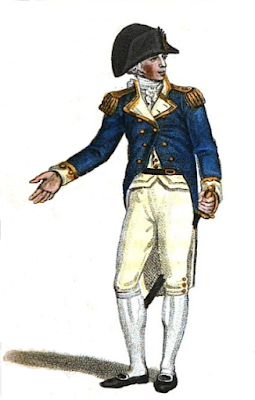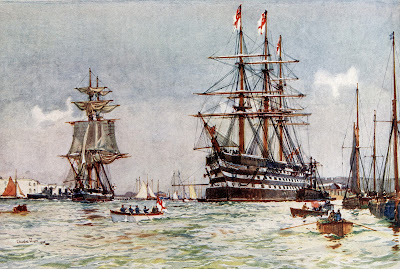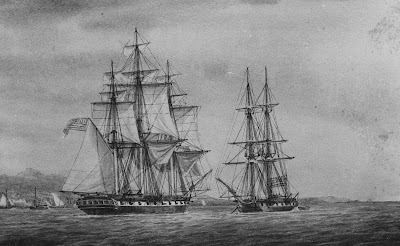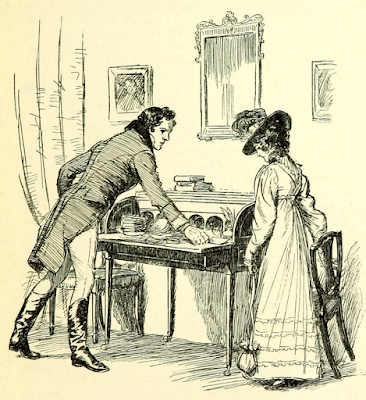 |
| A Captain in the Navy from A book explaining the ranks and dignities of British Society by C Lamb (1809) |
Unless you were an officer in the Royal Navy. Through Captain Wentworth, Jane Austen’s fictional hero in her novel Persuasion, we glimpse a long-established and accepted practice that allowed young men to usurp the usual rules of birth and rank.
That practice was the Royal Navy tradition of prizemoney. It allowed men to acquire huge sums of money relatively quickly, and entirely legitimately. With that money came prestige and power.
Breaking through the ranks of Regency society
Sir Walter Elliot, father of Austen’s heroine in Persuasion, and a committed believer in the principle of rank being fixed by birth, had two complaints about the Navy:First, as being the means of bringing persons of obscure birth into undue distinction, and raising men to honours which their fathers and grandfathers never dreamt of; and secondly, as it cuts up a man’s youth and vigour most horribly.1
His second complaint had some merit. Life at sea was dirty, dangerous and often disfiguring, as demonstrated by Lord Horatio Nelson, who lost an arm and an eye in battle. But many men risked the perils of life at sea, because it might bring them those honours which their fathers and grandfathers never dreamt of. These honours included cash prizes.
The many wars against France meant Jane Austen’s lifetime was a particularly rich period for Royal Navy prize captures.
 |
| Old Sir Archibald Drew and his grandson by H Thomson (1897) From Persuasion by Jane Austen (1897 edition) |
A naval career for ‘persons of obscure birth’
Unlike the army, a naval officer could not purchase a commission. They had to start at the bottom of the officer hierarchy, and they had to start young.
Jane Austen doesn’t tell us when Wentworth joined the Navy, but we should assume he was in his early teens, perhaps younger. Two of Jane’s brothers joined the Navy, Francis and Charles, beginning their careers aged about 12. Horatio Nelson also joined at 12. Most officers joined no later than age 13.
The Austens, Nelson and many others were born into large middle-class families of no particular distinction, and no great income. They were ‘persons of obscure birth’ who needed to become self-sufficient as soon as possible.
The Navy attracted many such men, or rather, boys. Through connections, of family or friendship, they were taken on board ship as a captain’s servant or midshipman. This secured their spot on the lowest rungs of the Navy career ladder. It also entitled them to a share of prizemoney.
We can assume Wentworth’s family background was not dissimilar to that of Jane and her siblings. Frederick Wentworth has a brother who is a curate—again the lowest rung on a career ladder. The implication is that their family is middle-class—perhaps their father was a churchman like Jane Austen’s.
No prizes for a captain without a ship
 |
| HMS St Vincent 1815 Portsmouth Harbour by Charles Edward Dixon (1872-1934) |
Her father considers the match “degrading”. Her friend, Lady Russell, thinks it “most unfortunate”.
Part of the reason, Jane tells us, is that:
Captain Wentworth had no fortune. He had been lucky in his profession; but spending freely, what had come freely, had realised nothing.
Wentworth is 23 years old and has been in the Navy for around a decade. To become a captain he’s risen from being a cabin boy or midshipman, through to lieutenant and then to captain.
Through all those ranks he was entitled to receive prizemoney. He’s been lucky, implying he’s enjoyed success in naval actions, in making good connections and with earning money.
He’s also been spending freely. As a result, in 1806 the captain has no ship, no fortune and therefore, no Anne Elliot.
How the prizemoney system worked
For hundreds of years it had been customary for sailors to be given a share of the value of a captured ship. The ship and its cargo were sold, and the cash shared out.
The prizemoney was split across all the ships at the scene of the action.
This process was enshrined in English law through various acts of Parliament. When Wentworth joined the Navy in around 1796, the rules of the prize allocation had been in place for almost one hundred years.
Allocation was based on dividing the total value of a prize by eight. Two eighths were shared between all the seamen, that is, the lowest ranks on a ship. However, as there were perhaps two or three hundred men, the amount each man received was small.
As a midshipman and then a lieutenant, Wentworth would have done better. Both these ranks had a share of one eighth of the prize value. There being less officers at these ranks, his individual share would have been greater.
Let’s turn that into numbers. The average value of a prize was around £2,300. One eighth of this is £288.
Captains made the most money from the prize system. A captain was entitled to at least two eighths of a prize, perhaps more depending on the circumstances.
So while the £288 was shared between all the lieutenants and others of equal rank, the captain’s share was at least double that—£576. Remember that if more than one ship was at the scene, this would be shared between all the captains.
It could take months, even many years, before prizemoney was finally agreed. Then it was paid in the form of a promissory note. Lower ranks often sold this at a discount, in order to get cash.
Jane Austen implies that Captain Wentworth did well in his first decade in the Navy, including financially. Unfortunately, he spent as much as he earned. As such, his rank in the Navy meant little to the likes of Sir Walter Elliot.
At this stage in his career, Captain Wentworth:
…had nothing but himself to recommend him, and no hopes of attaining affluence, but in the chances of a most uncertain profession, and no connexions to secure even his farther rise in the profession.
Becoming the gallant Captain Wentworth
 |
| Sloop USS Peacock capturing British brig Nautilus June 1815 |
How did he improve his financial situation so dramatically? Through prizemoney.
On leaving Somersetshire in 1806 he got command of the Asp, a sloop based in the West Indies. A sloop is a small ship, often with a crew of less than 50. Despite its size, Wentworth was able to take “privateers enough to be very entertaining”, meaning he captured a number of enemy ships. Each capture brought him prizemoney.
His next command was the Laconia:
“How fast I made money in her. A friend of mine and I had such a lovely cruise together off the Western Islands.”
A year later saw Wentworth cruising in the Mediterranean “when I still had the same luck”.
It took Captain Wentworth just seven years to convert his fortunes. Penniless in late 1806, he returned to Somersetshire in 1814 a very wealthy, and eligible, man. Most, if not all, of that money came from naval prizes.
The majority of naval captains could expect to earn a little over £300 a year. On average, they could expect to earn several times that amount in addition through prizemoney, every year. Jane Austen implies that Wentworth’s earnings were above what many of his contemporaries enjoyed—after all, he enjoyed a fair amount of luck.
And, of course, he won the greatest prize of them all—Anne Elliot.
 |
| Captain Wentworth leaves a letter for Anne by H Thomson (1897) From Persuasion by Jane Austen (1897 edition) |
If you have enjoyed this blog and want to encourage us and help us to keep making our research freely available, please buy us a virtual cup of coffee by clicking the button below.
Note
1. All quotes from Austen, Jane, Persuasion (1817).
Sources used include:
Benjamin, Daniel K, Golden Harvest: The British Naval Prize System 1793-1815 (2009)
Lavery, Brian, Nelson's Navy (1989)

